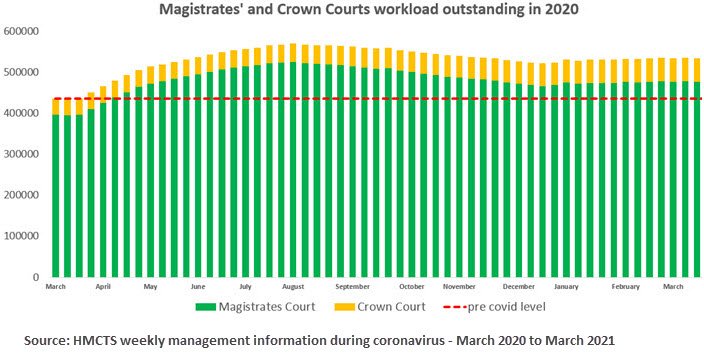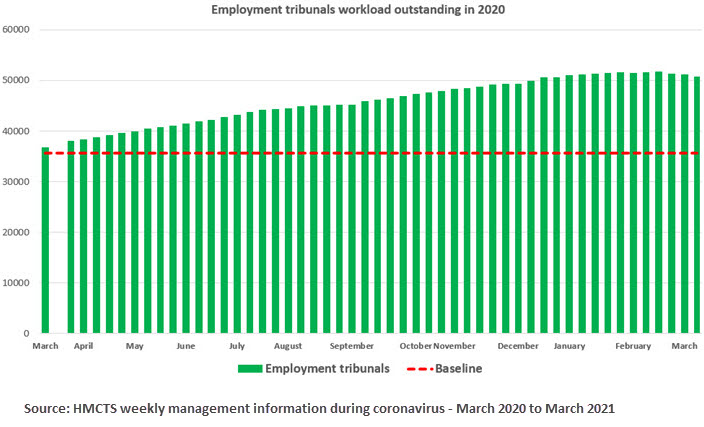Contact us
If you need assistance with anything from a quote to a new claim, you can contact us in the following ways.

Published on 10/05/2021
This is the third and final part of our article series "How has Covid-19 affected access to justice?".
You can download the entire white paper using the link at the bottom of the page.
For a justice system already debilitated by years of underinvestment, the pandemic could scarcely have arrived on our shores at a worse time. The immediate closure of court and tribunal buildings slowed the administration of justice to a snail’s pace.
Fortunately, the flow of new cases into many parts of the justice system also dropped significantly. Just as the lockdown inhibited the crime-rate, furlough arrangements held back the inevitable tide of employment disputes and legislation also prevented landlords from seeking to remove tenants, through the courts.
The various parts of the system were also quick to adapt. Courts and law firms alike, shifted quickly to virtual hearings, reserving the practical challenges of in-person hearings for those case in which there was no alternative.
Despite all of these best efforts, the backlog of cases in almost all courts and tribunals increased substantially during the pandemic. In criminal cases, this inevitably means that the innocent will take much longer to prove their innocence, while the guilty have a better chance of evading justice.
In civil matters, such as employment tribunals, witnesses will similarly find it much harder to recall events and both the business and the employee will have to wait longer for justice to be served.
While the Ministry of Justice introduced further measures throughout 2020, such as the opening of “Nightingale Courts” and drafting underutilised, non-specialist judges to sit in employment tribunal matters, the backlogs have persisted into 2021.
It is not simply court and tribunal delays that have forced parties to explore alternative methods for resolving civil disputes. The legal ban on evicting private tenants, introduced in March 2020, put many landlords, especially those dependent on income from a single property or small property portfolio, in an impossible situation.
Following the swift passage of the Coronavirus Act 2020, ARAG introduced an alternative claims process that enabled landlords to agree rent reductions or negotiated termination with tenants, providing a legal remedy for all parties where none was available through the courts.
At the end of March, the Law Society Gazette reported that the Civil Justice Council was considering whether or not mediation should be made compulsory in some cases.
Legal expenses insurance providers have a unique insight into the demands on our justice system, and this has proved particularly useful throughout the course of the pandemic. The volume and subjects of legal advice calls offer a strong indication of future claims trends and potential litigation.
Early in the pandemic, there was a huge influx of enquiries, particularly around the previously unknown concept of furlough but also around wider employment, contract and tenancy issues. Small business owners and employees in general were desperate to know what their rights were and how to proceed in this unprecedented new legal environment.
Call volumes settled back to more normal levels over the Summer, but there was another surge in activity in the Autumn, as uncertainty over the end of the furlough period prompted enquiries about redundancy and other employment questions.
While furlough may have held back the tide of unemployment among small and medium-sized businesses to some extent, it is unlikely to prevent the wave of redundancies that legal expenses insurers know, from experience, will accompany a recession.
Of these, some will inevitably result in disputes and employment litigation, which is not good news for a tribunal system already struggling to cope with claims that started early in 2020 and even before.
At the same time, disputes over commercial contracts are also likely to increase, both as a result of pressures brought about by the recession, but also as a consequence of Brexit.
Legal expenses insurance has always offered a highly affordable and widely available means of accessing justice that has become ever more valuable as other paths to justice have been blocked or made increasingly difficult and expensive.
This value has also increased over the years, as the range of insured risks has broadened and additional benefits such as different helpline and digital legal services tools have been added to enhance and differentiate products in this maturing market.
While claims are almost certain to increase significantly in the short to medium term, they will help to sustain the trend of increasing awareness about the availability and enormous benefits offered by legal protection products.
While the next few years look set to prove extremely difficult for the justice system and busy for legal expenses insurance providers, it is clear that legal protection has a critical role to play in helping the UK recover from the immediate and longer-term impact of Covid-19.
Disclaimer - all information in this article was correct at time of publishing.

